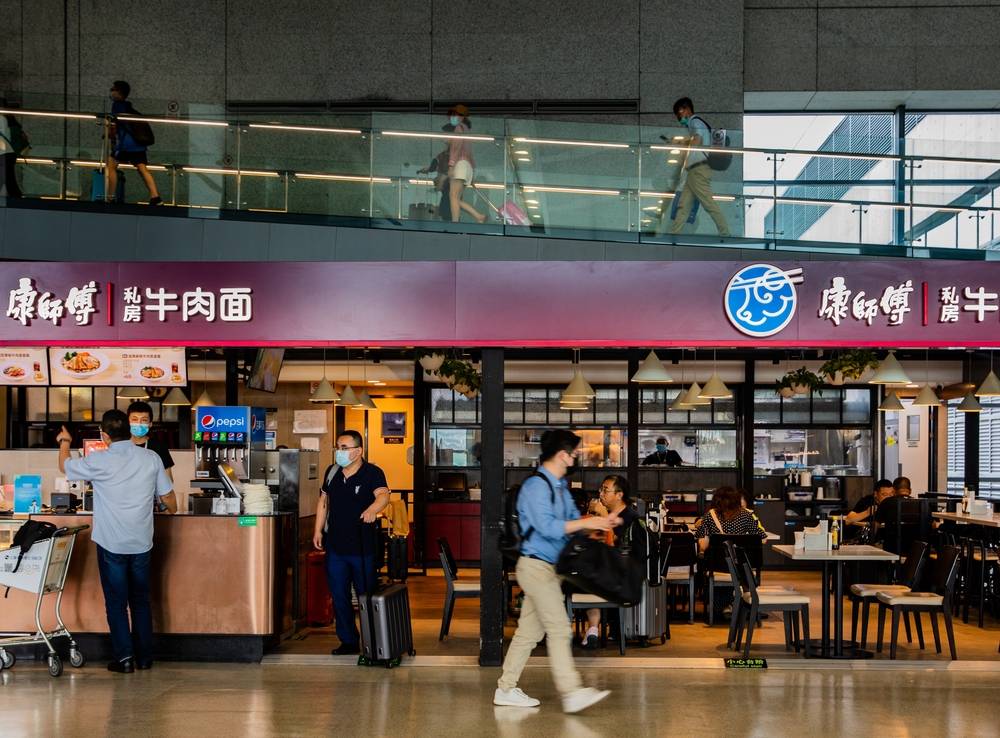Noodle Maker Master Kong Showcases How To Cut Plastic Waste
- None.
- None.
Insights
The collaboration between Master Kong, Alibaba Group and Veolia signifies a strategic move towards sustainability and circular economy business models. The initiative to recycle waste PET bottles into new products not only addresses the growing concern of plastic pollution but also positions the companies as leaders in environmental stewardship. The successful transformation of PET waste into recyclable pellets and subsequently into consumer products like storage boxes and luggage cases, demonstrates a closed-loop system that reduces the reliance on virgin plastic materials.
From a sustainability perspective, the reported 21% reduction in carbon footprint for the storage boxes is a significant achievement. This figure aligns with the global push for companies to reduce their greenhouse gas emissions in response to climate change. Moreover, the involvement of Master Kong, a major player in the food and beverage industry, highlights the potential for large-scale impact within this sector. The project's alignment with the United Nations Sustainable Development Goals further bolsters its credibility and may serve as a benchmark for industry best practices.
The consumer demand for sustainable products is a critical driver for such initiatives. Citing the Alibaba survey where 73% of consumers expressed interest in more sustainable supply chains and products, it is evident that there is a market for environmentally friendly goods. This trend is particularly relevant as more consumers become environmentally conscious and seek to align their purchases with their values. As a result, Master Kong and Alibaba's investment in recycling infrastructure and sustainable product development could foster brand loyalty and attract new customers who prioritize sustainability.
Furthermore, the sale of 20,000 recycled PET storage boxes indicates a successful proof of concept for the recycling initiative. The ability to monetize recycled materials can create an additional revenue stream for Master Kong and Alibaba, potentially impacting their financial performance positively. However, the long-term success will depend on the scalability of the recycling process, consumer adoption rates and the economic viability of producing recycled products in a competitive market.
The pilot project's implications extend beyond environmental benefits to potential economic impacts. By incorporating recycling into their business model, Master Kong and Alibaba are tapping into the 'green economy,' which is gaining traction globally. The reduction in carbon footprint from the use of recycled PET pellets can contribute to lowering environmental taxes and can be an attractive point for investors looking for sustainable investment opportunities.
Additionally, the initiative could lead to cost savings in the long run, as the price of raw materials often fluctuates due to market conditions and regulatory pressures. Using recycled materials could provide a hedge against such volatility. It's important to note that initial investments in recycling infrastructure and technology may be substantial, but the long-term payoff includes reduced material costs and potential subsidies for sustainable practices.
As the project scales up, it could also stimulate job creation within the recycling industry and contribute to economic growth in this sector. The collaboration with Veolia, a global leader in optimized resource management, may also open doors for further technological advancements in waste management and recycling processes, fostering innovation and economic development.
NORTHAMPTON, MA / ACCESSWIRE / January 3, 2024 / Alibaba Group:
By Alison Tudor Ackroyd and Ivy Yu
- France's Veolia helped turn Master Kong's waste plastic bottles into recyclable PET pellets
- Storage boxes created from PET bottles had a
21% smaller carbon footprint, Alibaba Cloud certified
Master Kong, an instant noodles and beverage giant in China, teamed up with Alibaba Group and French utility Veolia to help shrink its carbon footprint.
The pilot project involved recycling Master Kong's waste plastic bottles into new products sold on one of Alibaba Group's grocery platforms. Master Kong is China's largest instant noodles maker and exclusively makes, distributes and sells PepsiCo soft drinks in China.
As world leaders gather in Dubai to discuss the climate crisis at COP28, the pilot showcased how companies with different skill sets could collaborate to recycle waste at scale.
Master Kong, whose holding company is Hong Kong-listed Tingyi (Cayman Islands), collected waste PET bottles and transported them to a processing plant. PET, or polyethylene terephthalate, is a clear and
At the plant, water, waste and energy management group Veolia turned the PET bottles into PET pellets, which can easily be made into new products. To complete the circle, the pellets were then used to produce goods for sale on Tmall Supermarket, an Alibaba-owned grocery purchasing platform.
In its latest annual report, Master Kong said had turned the PET pellets into storage boxes and luggage cases with its partners. Twenty thousand recycled PET storage boxes were sold during the project, which ran from August, 2022 to May this year.
The initiative is part of Alibaba and Master Kong's commitment to tackle the plastic pollution crisis. Every day, the equivalent of 2,000 garbage trucks full of plastic are dumped into the world's oceans, rivers, and lakes, according to the United Nations.
Alibaba and Master Kong are also founding members of the Global Development Initiative for Sustainable Development Goals, launched by the UN Global Compact in China in 2022.
Certification
Consumers are increasingly using their purchasing power to push brands to show how their supply chains and products are sustainable. An Alibaba survey found that
Master Kong turned to Alibaba Cloud to help it document its recycling initiative. The cloud computing company's carbon management platform Energy Expert monitored and recorded the carbon emission savings from recycling Master Kong's PET plastic bottles in 2022.
Energy Expert found that seven waste plastic bottles could be turned into one PET storage box. Each recycled PET storage box has a cradle-to-gate carbon footprint of 1.002kg/unit.
As a result of its recycling process, the carbon footprint of each PET storage box was
Energy Expert leveraged blockchain technology to boost transparency and ensure data was safely processed during the process. It documented information, including real-time production pictures, shipping order numbers and production batch numbers on the blockchain to ensure that data is stored securely and tamper-proof.
Consumers can also find a QR code in each of the recycled PET storage boxes that they can scan to examine carbon emission data spanning the entire production chain, from recycling and transportation of PET bottles to the transportation of finished products to the warehouse.
The 20,000 recycled PET storage boxes sold during the project each had its own label detailing its carbon footprint.
The pilot project is one of several sustainability projects Master Kong is pursuing. The group also released the first standard for carbon footprint accounting and carbon neutralization evaluation standard for tea beverages in China.
Please refer to https://www.alizila.com/esg/ for additional information about Alibaba's sustainability efforts.

A Master Kong restaurant in Shanghai. Photo credit: Shutterstock
View additional multimedia and more ESG storytelling from Alibaba Group on 3blmedia.com.
Contact Info:
Spokesperson: Alibaba Group
Website: https://www.3blmedia.com/profiles/alibaba-group
Email: info@3blmedia.com
SOURCE: Alibaba Group
View the original press release on accesswire.com
FAQ
What is the collaboration between Master Kong (Tingyi) and Alibaba Group and Veolia about?
What did the pilot project involve?
What products were created from the recycled PET bottles?
What impact did the storage boxes created from PET bottles have?
What is PET and how is it used in this project?
What is the significance of the initiative in the context of the climate crisis?







